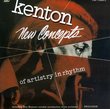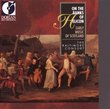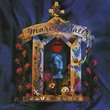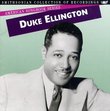| All Artists: Arnold Bax, Bryden Thomson, Ulster Orchestra Title: Arnold Bax: Symphony No. 4; Tintagel Members Wishing: 1 Total Copies: 0 Label: Chandos Release Date: 7/29/1992 Genre: Classical Styles: Forms & Genres, Theatrical, Incidental & Program Music, Historical Periods, Modern, 20th, & 21st Century, Symphonies Number of Discs: 1 SwapaCD Credits: 1 UPC: 095115831229 |
Search - Arnold Bax, Bryden Thomson, Ulster Orchestra :: Arnold Bax: Symphony No. 4; Tintagel
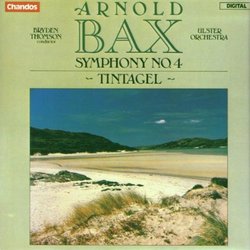 | Arnold Bax, Bryden Thomson, Ulster Orchestra Arnold Bax: Symphony No. 4; Tintagel Genre: Classical
The darkness of Arnold Bax's Symphony 3 (1929-30) dissipates from the composer's temperament in his Symphony 4. Here, Bax is his usual cosmopolitan self, his music often sounding a mixture of French, German, and British-... more » |
Larger Image |
CD DetailsSynopsis
Amazon.com The darkness of Arnold Bax's Symphony 3 (1929-30) dissipates from the composer's temperament in his Symphony 4. Here, Bax is his usual cosmopolitan self, his music often sounding a mixture of French, German, and British--and at the same time sounding like none of them. Bax's strengths are in color and texture (rather than theme and development), and while his music is romantic, it is clearly of a 20th-century rather than an earlier Britain, such as might be found in Ralph Vaughan Williams's music. The discmate here is Bax's most famous tone poem, Tintagel, which happens to be the best introduction to Bax's music there is. --Paul Cook Similarly Requested CDs
|
CD ReviewsHappy Bax K. Farrington | Missegre, France | 04/10/2000 (5 out of 5 stars) "This CD is one of my all time favourites for it shows Bax in exultant mood at the height of two passionate love affairs in his life. It is interseting that Bax turned to the sea when he was writing music in the midst of a passion. 'Tintagel' was composed in 1917 when Bax was enjoying the delights of his stormy affair with Harriet Cohen with whom he had six weeks at this location in North Cornwall. The work is of Bax's best known and is of his true best in terms of sheer flamboyance in music in an outpouring of brilliance. The opening with its 'waves' in the strings and wind and brass sforzandi setting the ruined castle on the rock is pure musical poetry. The central slower section has excitement but has a quotation of 'sick Tristan' which Bax uses imaginatively as ever. The final reprise of the opening but now 'nearer' and louder is one of those truly thrilling moments which defy verbal description and can only be experienced. The Symphony No 4 dates from 1930. I have an ancient recording of this work on vinyl with Vernon Handley (photo with hair!) conducting the Guildford Philharmonic Orchestra on a very funky obsolete label! I used to play this through with my friend who really enjoyed the snap, crackle and pop of the inferior record manufacture, particularly the opening with Bax's depiction of a 'spring ride at noon'. This Cd is the first opportunity we have of really hearing this first rate work. Bax was now in love with Mary Gleaves and the seascapes here are 'happier' and are redolent of a calmer and carefree relationship than with the storm tossed affair with 'Tania'. This work lacks the cohesion and brilliance of 'Tintagel' but Bax really comes out with some interesting episodes in the first movement particularly. The 'sea' is now not depicted so overtly but is more 'internalised' into his mood and changing feelings. Bax plays a little 'joke' on us when dark clouds form and we expect one of his cataclysmic explosions and then it all disperses into nothing! The slow movement is looser structured than, say, his first three or the sixth but has some beautiful episodes in it. The finale is perky and has a little waddling trumpet tune which stays with you afterward. This symphony is revealed as being a weightier work than was thought up to the 1980's. It is obvious that its mix of outgoing and sad with the rapid changes in speed and rhythm make this work very difficult to pull off indeed. Needless to say, I will not be dusting down my vinyl version and trying to cut out the excessive treble any more. Thank you to Thomson and Chandos, once again!" For Such a Great Piece as Tintagel James N. Holland | Heredia, Costa Rica | 12/19/2005 (5 out of 5 stars) "Arnold Bax's music has somehow gotten lost in the muddle of twentieth century music. A neo-romantic composer, his works are still of value and perhaps his masterpiece, Tintagel, is the best representation of his work. This CD is of high quality and the performance is excellent. I have no reservations recommending it." ... David Brooks | Spruce Grove, AB Canada | 03/02/2004 (5 out of 5 stars) "The Symphonic poem "Tintagel" is Bax's finest and best known compositions. It evokes a tone picture of castle-crowned cliff of Tintagel and it's association with King Arthur, his wizard Merlin. It has always been a place of mystery and wonder with the ruined piles of an ancient castle set high above the pounding waves of the North Atlantic. I think most people won't admire "Symphony No.4" as much as the achievement of "Tintagel" and is often neglected along with his other 6 Symphonies among the several tone poems that he had written. The 4th Symphony demands the best possible recorded sound, brilliant playing...this digital recording is the first adequate opportunity many music lovers have had to properly access the work."
|

 Track Listings (4) - Disc #1
Track Listings (4) - Disc #1




